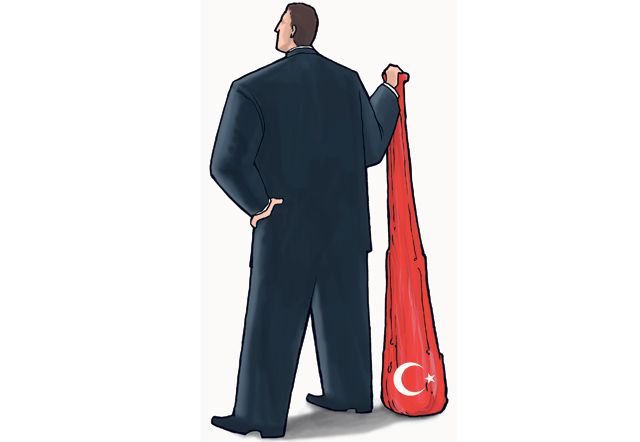US President Theodore Roosevelt famously said in 1901 that strong nations should "speak softly and carry a big stick". His big stick was the military might of the United States, wielded repeatedly throughout the 20th century.
One hundred and eight years later, Turkish Prime Minister Recep Tayyip Erdogan is walking the same path, adding a new twist to what has since been called ‘Big Stick Policy'. Erdogan is speaking loudly and carrying a big stick. His big stick is the political and military might of Turkey.
Nowhere is this policy more apparent than in Turkish-Israeli relations, which have been spiralling downwards since Erdogan decided to cement relations with Syria, put his full weight behind the Palestinians and back non-state players such as Hamas.
Many in Israel at first downplayed the threat posed by Erdogan's new agenda. They claimed he was only using Syria and the Palestinians to endear himself to the Muslim world and said this would never affect their country's historic relationship with Turkey.
Earlier this year, however, Erdogan famously stormed off the stage at Davos in Switzerland, telling Israeli Prime Minister Shimon Peres, before the international media, that he was a criminal who had butchered Palestinians in Gaza.
In September, Erdogan sent shock waves through Tel Aviv by backing the UN-mandated Goldstone Report, which accuses Israel of committing war crimes in Gaza. He has never missed the chance to call for an end to the blockade of Gaza, saying that it places 1.5 million Palestinians in a large prison.
Two weeks ago, tensions erupted yet again between the two countries when Turkey prevented Israel from participating in a Nato drill. Additionally, the Turks recently aired a TV show called Separation, showing the Israel Defence Forces attacking, insulting, and ridiculing Palestinian civilians. Israeli soldiers are also shown killing a newborn Palestinian baby, and an elderly man on his way to Makkah.
Reportedly, Turkey has also decided to end defence and military cooperation with Israel, cancelling projects worth up to $1 billion (Dh3.6 billion). Israeli officialdom was enraged, since all of this comes after a series of events that included Erdogan's 2004 refusal to accept an invitation to visit Israel extended by then prime minister Ariel Sharon.
Instead, he welcomed a delegation from Hamas in Ankara in 2006, headed by Khaled Mesha'al. The Israelis panicked, realising that Erdogan's policies amounted to far more than just lip service paid to the Arabs and were striking at the very core of the Ankara-Tel Aviv axis.
Benjamin Netanyahu, the hardline Israeli prime minister, recently snapped that Turkey can no longer serve as an honest broker in any Middle East conflict, because it has clearly sided with the Arabs against Israel. His deputy, Silvan Shalom, tried to downplay the crisis, opining that the slump in relations was temporary.
Inflated relationship
He quickly added that he did not know why tensions had developed between Tel Aviv and Ankara, only noting that his government was not responsible.
To this, several Turkish newspapers close to the ruling Justice and Development Party (AKP) party replied that relations were in fact returning to normal between Turkey and Israel, claiming that the abnormal had been the "inflated" relationship that existed from the 1950s to the late 1990s. For all practical purposes, and so long as the AKP is in power, that honeymoon is now over.
Turkey was the first Muslim country to recognise the State of Israel in March 1949, two months before it was admitted to the United Nations. Several of Israel's founding fathers, such as David Ben Gurion and Moshe Sharett, studied at Turkish schools in Istanbul during the years of the Ottoman Empire, spoke fluent Turkish, and were well accustomed to Turkish ways of life.
During the Second World War, Turkey provided sanctuary to many leading European Jews fleeing the Nazi dragnet, giving them visas, accommodation and political cover. After 1948, military and diplomatic cooperation ensued — almost uninterrupted — for the next 60 years. There were also plans to build a massive pipeline from Turkey to supply water, electricity, gas and oil to Israel. In 2000, the two countries signed a free trade agreement.
One question on everyone's mind is: why is Turkey doing this? The simple answer is: Erdogan, a pragmatic man of principle and character, genuinely feels for the Palestinians. That, in addition to his strategy to advance relations with the Arab and Muslim world, explains Turkey's behaviour.
This does not mean that he wants to sever Turkish-Israeli relations, as some Israelis are saying. Far from it, Erdogan believes that Turkey can and must play the role of a go-between, as it did between Syria and Israel. He feels that Turkey should walk the extra mile — carrying a big stick — and put controversial matters into perspective.
Erdogan's stick may not be comparable to Roosevelt's, but it is a big one nevertheless, carried by a Nato member that happens to have stood by Israel for years, and is now the world's 15th largest economy.
Sami Moubayed is editor-in-chief of Forward Magazine.











